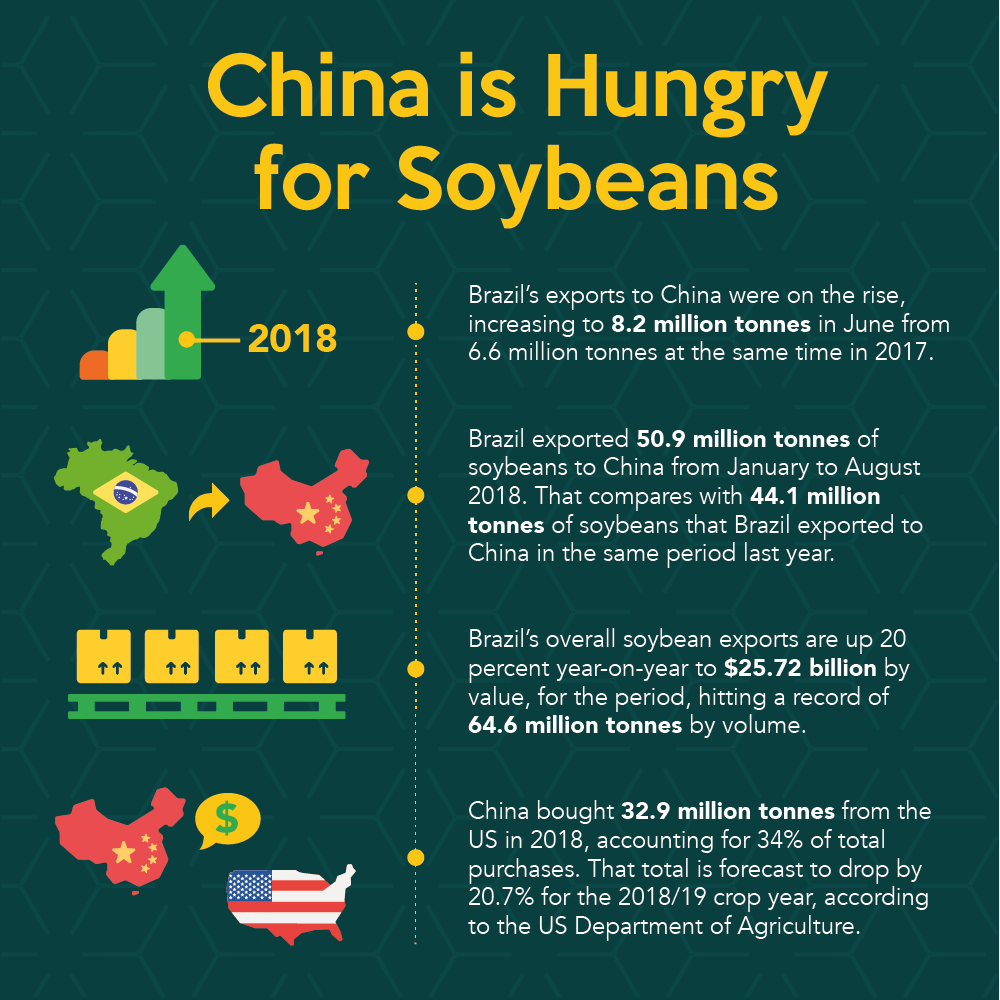The recent trade war initiated by the US with tariffs against several of its major trade partners has led to a reshuffling of trade alliances across the world. One of the major winners of this trade war is Brazil. The South American superpower is now the largest exporter of soybeans to China and the eastern power has been making major infrastructure investments into Brazilian agriculture, marking the development of the trade partnership between the two countries. Brazil’s agriculture industry has been experiencing tremendous growth in recent years and this growth is expected to continue under a new government which has stated its support for the agriculture industry and foreign investment.
China is Brazil’s biggest trading partner. From 2003 to June this year, Chinese companies have invested almost US$ 54 billion in around 100 projects in Brazil, according to figures from Brazil’s planning ministry. From 2005-2017, Brazil has been the recipient of 55% of all investments made by Chinese businesses in Latin America, according to the UN Economic Commission for Latin America and the Caribbean.
The US has always been one of the major importers of soybeans to China, however, after the recent set of tariffs imposed by the Trump administration on Chinese goods, China has retaliated by shifting its trade relations to alternatives like Brazil. As a result, the Brazilian crop is being sold at a premium, and further increasing investment in Brazilian agriculture. Soybean consumption and imports in China have nearly doubled over the last 10 years, soaring from 59 million tonnes to 113 million tonnes and 50 million tonnes to 95 million tonnes, respectively, according to the U.S. Department of Agriculture (USDA).

Besides soybeans, food security has historically been a central concern of state policy and China has maintained a remarkable level of food self-sufficiency over the last 32 years of frenetic economic growth and urbanization. However, in recent years it has had to increase its imports to satisfy the demand of its growing population.
China’s total arable land declined for a fourth consecutive year in 2017 as a result of new construction, natural disasters and environmental requirements, as well as agricultural production changes. The Ministry of Natural Resources said the country’s total arable land fell to 134.86 million hectares, a moderate decline of 60,900 hectares compared to the previous year. China’s farm produce imports hit record highs in 2017, with imports increasing 12.8 percent to reach 125.9 billion dollars.
As part of the BRICS nations, which refers to Brazil, Russia, India, China and South Africa as emerging economies, Brazil’s trade with China is poised to become not only a fruitful relationship between these two countries, but also one that may define global trade in the future.
Beijing-based China Communications Construction Co broke ground in March on a port in the northeastern state of Maranhao that will ship millions of tonnes of agricultural exports per year, that will find their way to the Chinese market. The R$1.8 billion (US $520 million) investment is being financed by Industrial & Commercial Bank of China Ltd., the world’s largest lender by assets, which set up shop in Brazil in 2013.
This investment is a further signal of the bright future of Brazilian agriculture, an industry that will play a pivotal role in satisfying the global growing food demand. Operating the largest commercial neem plantation in the world, we have positioned ourselves as a major player in Brazil, by offering solutions to the increasing need for mankind’s most fundamental resources, securing long-term returns and guaranteeing the availability of resources and the overall health of the environment and humanity.